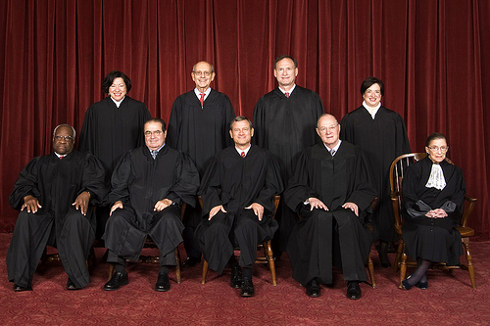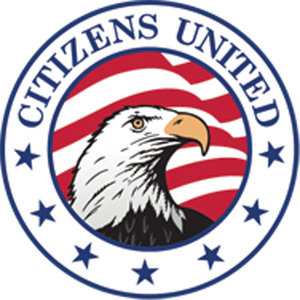What is Citizens United? The short answer is it’s two different but related things: a Political Action Committee (PAC) in Washington, D.C., and a Supreme Court case about election spending in which the aforementioned PAC was the plaintiff. Both lie at the center of a debate over the role corporations play in society. Read on for the long answer.

It’s a Political Action Committee
Citizens United, the PAC, was founded in 1988 by Floyd Brown, a longtime Washington political consultant, with major funding from the Koch brothers (industrialists who own “the second largest privately owned company in the United States”). The group promotes corporate interests, socially conservative causes and candidates who advance their goals, which it says are “…limited government, freedom of enterprise, strong families, and national sovereignty and security.” It gained fame in 2009 for suing the Federal Election Commission, leading to a controversial Supreme Court case (now also commonly known as Citizens United) eliminating some restrictions on how corporations can spend money in elections.
It’s a Supreme Court Case
In the 2008 election season, Citizens United the PAC sought to broadcast TV ads for a video-on-demand film criticizing presidential candidate Hilary Rodham Clinton, but doing so would violate the 2002 Bipartisan Campaign Reform Act (known also as the McCain–Feingold Act), which barred corporations and unions from paying for media that mentioned any candidate in periods immediately preceding elections.
Citizens United challenged the law, suing the Federal Election Commission (which sets campaign finance laws and election rules), and the case made its way through lower courts until an appeal was granted by the U.S. Supreme Court.
In a 5-4 ruling, the Justices declared unconstitutional the government restriction on “independent” political spending by corporations and unions, and determined the anti-Clinton broadcast should have been allowed. The decision overturned century-old precedent allowing the government to regulate such spending. As a result, Citizens United has greatly affected the way corporations and unions can spend on elections (more on that below).
The Court majority (Justices Kennedy, Roberts, Alito, Scalia, and Thomas) argued:
- barring independent political spending amounts to squelching free speech protected by the First Amendment.
- the First Amendment protects not just a person’s right to speak, but the act of speech itself, regardless of the speaker. Therefore the First Amendment protects the speech of corporations and unions, whether we consider them people or not.
- although government has the authority to prevent corruption or “the appearance of corruption,” it has no place in determining whether large political expenditures are either of those things, so it may not impose spending limits on that basis.
- the public has the right to hear all available information, and spending limits prevent information from reaching the public.
The Court minority (Justices Stevens, Ginsburg, Breyer, and Sotomayor) argued:
- the First Amendment protects only individual speech.
- government may prevent corruption, and campaign spending can be corrupt when it buys influence over legislators. Therefore government may impose spending limits on corporations and unions.
- government may prevent the appearance of corruption, which undermines public confidence in democracy. Limits on corporate and union political spending are an expression of that authority.
- the public has the right to hear all available information, and when corporations spend money individuals can’t match, messages from corporations drown out messages from others, and that information fails to reach the public.
Initial Public Response
The decision was controversial and set off a ferocious debate which continues to this day.
- Some celebrated the decision, claiming it advanced free speech and allowed any company to compete on equal footing with media organizations that already “freely disseminate their opinions about candidates using corporate treasury funds.”
- Some were neutral, arguing the decision would only boost the volume of political ads, which wouldn’t affect public discourse or governance for better or worse.
- Others were critical. For example, President Barack Obama said the decision, “Gives the special interests and their lobbyists even more power in Washington — while undermining the influence of average Americans who make small contributions to support their preferred candidates.”
Effects of Citizens United
An explosion in independent political spending ensued in the decision’s aftermath, as this chart from the Center for Responsive Politics illustrates.
Spending was on the rise even before Citizens United, but the post-decision increase was dramatic. The 2012 presidential election was the first following Citizens United, with more than twice the political spending as any previous election. Independent political spending of the kind Citizens United allows accounted for all of that increase.
Is this new determining the winners of elections? Yes, after a decade of data, research shows that the candidate who has more money, wins more often.
What’s Reclaim Democracy’s Position?
We oppose the Court’s Citizens United ruling, for the following reasons:
- Given the strong restrictions our country’s founders imposed on corporate activities, they clearly didn’t intend for corporations to enjoy constitutional protections.
- The government has the authority to prevent corruption or the appearance of it, but the Citizens United majority opinion says the government has no right to decide whether independent political spending drives those things. We argue government can’t prevent corruption without the ability to identify the causes. This isn’t just a theoretical problem, because evidence suggests both government-corporate relations appear corrupt to the electorate, and those relations are in fact corrupt.
- The majority’s claim that spending limits prevent full information from reaching the public ignores reality. We’re bombarded by information. We register only a fraction of it, and money (spent on advertising and promotions) strongly determines what ends up in that fraction. When wealthy groups can spend whatever they want, they can make sure their messaging drowns out other voices and limits the information reaching the public.
- The Court had to overturn one of its own decisions to decide Citizens United as it did. The Court normally honors a custom called Stare Decisis, which means it tries not to overturn its own decisions if it can avoid doing so, by deciding a case on narrower grounds. In this case, the path was clear: the Court could have ruled the McCain-Feingold law doesn’t apply to video-on-demand, a decision which would have aligned better with previous decisions. The Justices went far beyond what Citizens United’s own lawyers asked for!
Beyond the legal objections, unlimited political spending by corporations and unions causes several problems:
- It prevents a “meritocracy of ideas.” Unlimited political spending allows ideas to dominate not by merit, but by their supporters’ ability to broadcast them.
- It has influence far beyond the ads it pays for. The more money a politician needs to compete for office, the more she must court the wealthy, leaving less time to govern and less contact with average citizens. Another consequence is that legislators’ lives get tied up with wealthy supporters in ways that have led to widespread corruption in both parties.
- The kind of unlimited political spending Citizens United allows (mostly on attack ads) creates a crude, counterproductive form of political dialogue, which breeds unthinking partisanship and oversimplified discussion via sound bytes. We need to create a culture in which thoughtful political discussion can flourish, but the unregulated flood of money that Citizens United unleashed makes it harder to do so.
- It gives large corporations anti-competitive advantages over small businesses.
We believe citizens and their elected representatives must have the right to limit the influence of money on candidates and elections in order to protect the integrity of elections and government. This includes the ability to implement public financing systems that match private spending.
The Big Picture
Citizens United isn’t an isolated problem. It’s a symptom of a bigger, longstanding threat: for decades the largest corporations have been building power over our political process — power that comes at the expense of citizens.
One of the main instruments of this influence is the legal concept of “corporate personhood,” wherein corporations receive the same Constitutional protections as individuals. Corporations use these protections to claim the “right” to lie to the public, for example, or to influence elections in various ways. Corporations have lobbied for and received these protections for decades, despite our country’s founders intending no such thing.
An important note: Citizens United isn’t technically an extension of corporate personhood. The Court majority didn’t say corporations have free speech rights because they’re people, but instead stated non-persons have free speech rights. If your toaster could talk, it would have those rights too.
The case clarified, however, that a Constitutional Amendment is the only way to strip corporations of “constitutional rights.” Moreover, many kinds of electoral reform, such as public campaign financing that truly levels the playing field, are legal impossibilities without first amending the Constitution (as a subsequent Supreme Court decision on campaign finance vividly demonstrates). For these reasons, there’s now a rapidly growing grassroots movement afoot to do so.
At the head of this Movement is Move to Amend, a broad national coalition with more than 150 chapters nationwide and nearly 250,000 endorsers (Reclaim Democracy is a co-founder). More than 600 cities and towns have passed resolutions or ordinances calling to end corporate personhood or have serious efforts underway.
Even more impressive, 10 states now have passed measures in opposition to Citizens United. Most recently, Colorado and Montana voters did so in early November 2012. Montana’s measure opposed not just Citizens United but also the Supreme Court’s creations of corporate personhood and “money=speech” (Buckley v Valeo), and passed by an overwhelming 75%-25% margin. See here for more on these successes.
Get Involved
If ever a time existed to get involved in the effort to revoke illegitimate corporate power, that time is now. We have the precious resource of real momentum, and the best way to protect that resource is through more participation. If you agree that corporations wield illegitimate power that we the people must take back, start or join a chapter of Move to Amend.
We also encourage you to help us keep broadening public awareness, reshaping public debate and providing more resources like this by donating to Reclaim Democracy. Your gift is 100% tax deductible.
Other Groups Working to Revoke Illegitimate Corporate Power
More Reading
- Citizens United vs. Federal Election Commission Ruling and Selected Media Coverage
- Wikipedia’s exhaustive article on the Supreme Court case
- SCOTUS blog Citizens United page with extensive coverage and documentation
- Our comprehensive overview of corporate personhood
- Index of articles related to Citizens United on Reclaim Democracy
Supreme Court photo courtesy nyfma
Citizens United logo courtesy OpenSecrets
Political expenditures chart courtesy OpenSecrets
By Nick Bentley
Organizer, Reclaim Democracy


